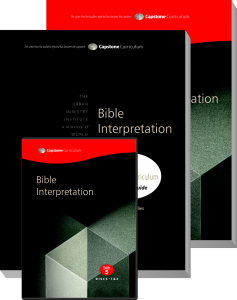
Module 5: Bible Interpretation
According to the clear testimony of the Scriptures themselves, God equips his representatives through the Spirit-breathed Word of God, the Scriptures. Everyone God calls into the ministry must determine to discipline themselves so as to master its contents, submit to its injunctions, and teach its truths. Like a workman (or work-woman!) they must strive to handle the Word of truth accurately, and so be approved of the Lord in their study (2 Tim. 2.15).
In this course we outline the need for biblical interpretation, and what is required to carry out this great task. We will explore both the divine and human dimensions of the Bible, and introduce an effective method of biblical interpretation designed to help you approach your study of Scripture so as to bridge the gap between our ancient and contemporary worlds. In addition, we highlight the importance of literary types in biblical interpretation, and explore the numerous kinds of solid scholarly reference tools available to us as we attempt to understand the meaning of a biblical text.
Course Details
Lesson 1: Biblical Inspiration
Lesson 2: Biblical Hermeneutics
Lesson 3: Biblical Literature
Lesson 4: Biblical Studies
Module Description
Bible Interpretation
According to the clear testimony of the Scriptures themselves, God equips his representatives through the Spirit-breathed Word of God, the Scriptures. Everyone God calls into the ministry must determine to discipline themselves so as to master its contents, submit to its injunctions, and teach its truths. Like a workman (or work-woman!) they must strive to handle the Word of truth accurately, and so be approved of the Lord in their study (2 Tim. 2.15).
This module focuses on the facts, principles, and implications of interpreting the Bible. In our first lesson, Biblical Inspiration: The Origins and Authority of the Bible, we will outline the need for biblical interpretation, and what we need to do to prepare for this great task. We will explore both the divine and human dimensions of the Bible, clarify the goal of all interpretation, and lay out clearly our theological assumptions regarding the high place of the Scriptures in the Church. We will especially concentrate on the kind of life and heart preparation necessary to interpret God’s Word accurately. We will also look at the Bible’s claim to be inspired of God, and its authority and place in theological and spiritual judgments in the Church. In a day where biblical scholarship has exploded, we will also take a brief look at modern biblical criticism, and wrestle with its claims as it relates to our study of Scripture today.
In our second lesson, Biblical Hermeneutics: The Three-Step Model, we will introduce an effective method of biblical interpretation designed to help you approach your study of Scripture so as to bridge the gap between our ancient and contemporary worlds. We call it the Three-Step Model: understand the original audience, discover general principles, and make applications to life. In this lesson, too, we will actually examine a passage of Scripture employing this model, looking at a passage in Paul’s letter to the Corinthians, in his first epistle, 9.1-14. Using the framework found in your Keys to Bible Interpretation appendix, we will canvass this great text of Scripture looking specifically at how a deliberate, careful, and prayerful approach can yield great knowledge and encouragement to us as we strive to understand God’s will through his holy Word.
We focus upon the types of literature found in the Bible and how to interpret them in our third lesson entitled Biblical Literature: Interpreting the Genres of the Bible. We will define and outline the concept of genres (pronounced JOHN- ruhs) in biblical interpretation, laying out an overview of the idea, and giving a few basic assumptions of this kind of special hermeneutics. We will then discuss various forms of biblical genres, but will give special attention to two types of literature which represent the vast majority of the actual material in the Bible, narrative and prophetic. We will give brief but meaty discussions of both narrative study (i.e., story theology) as well as prophetic and apocalyptic literature, showing how attention to genres can help us better interpret Scripture.
Finally, we will close our module study with our fourth lesson, Biblical Studies: Using Study Tools in Bible Study. Here we will explore the kind of solid scholarly reference tools available to us as we attempt to understand the meaning of a biblical text. The student of the Bible has access today to many remarkable tools, both written and software, all which can help him or her gain a mastery of the Word. We will concentrate first on the basic tools for solid biblical interpretation: a good translation of Scripture, Hebrew and Greek aids, a Bible dictionary, a concordance, and exegetical commentaries. We will also consider additional tools that may enrich our study of Scripture. These will include cross-reference aids, topical Bibles, cross-reference Bibles, and topical concordances. We will also discuss aids which focus on history and customs of the Bible: Bible dictionaries, Bible encyclopedias, atlases, and other related reference works. Finally, we will briefly look at Bible handbooks, study Bibles, and other helps, and conclude our discussion with the use of Bible commentaries, and the role of tools in general as you interpret your Bible for devotion, preaching, and teaching.
The Bible’s own remarkable claim of its transforming power ought to be reason enough to challenge us to master the Word of God. “All Scripture is breathed out by God and profitable for teaching, for reproof, for correction, and for training in righteousness, that the man of God may be competent, equipped for every good work” 2 Tim. 3.16-17. The God-breathed Word of God in the words of humankind is sufficient to enrich us, delight us, and make us competent and equipped for every good work. Truly, the Word of God cannot be broken, will always accomplish its purpose, and will ensure the person of God enjoys good success in all they do to advance the Kingdom of God wherever they are (John 10.35; Isa. 55.8-11; Josh. 1.8).
Reading Assignments
Lesson 1: Reading Assignments
By the conclusion of this lesson, you should have read the following:
Erickson, Introducing Christian Doctrine, pp. 15-37.
Geisler, To Understand the Bible Look for Jesus, pp. 7-52.
Fee, How to Read the Bible for All its Worth, pp. 9-106.
Wald, The New Joy of Discovery in Bible Study, pp. 4-31.
Lesson 2: Reading Assignments
By the conclusion of this lesson, you should have read the following:
Erickson, Introducing Christian Doctrine, pp. 41-59.
Geisler, To Understand the Bible Look for Jesus, pp. 53-87.
Fee, How to Read the Bible for All its Worth, pp. 94-186.
Wald, The New Joy of Discovery in Bible Study, pp. 32-65.
Lesson 3: Reading Assignments
By the conclusion of this lesson, you should have read the following:
Erickson, Introducing Christian Doctrine, pp. 60-81.
Geisler, To Understand the Bible Look for Jesus, pp. 88-123.
Fee, How to Read the Bible for All its Worth, pp. 187-245.
Wald, The New Joy of Discovery in Bible Study, pp. 66-91.
